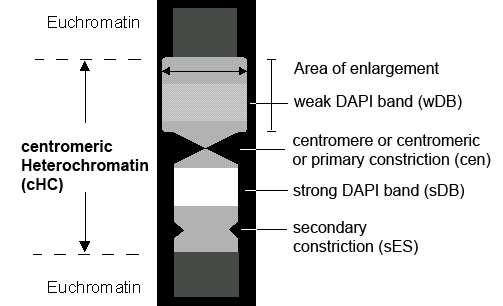Centromeric heterochromatin (cHC)
Both in phase contrast as well as in the DAPI fluorescence was conspicuous that the morphological variability of the polytene chromosomes was affected especially in euchromatic segments. On the other hand the expression of the nearby centromeric heterochromatin (cHC) as relatively constant. In particular, the following four features of the cHC allowed the identification of the chromosomes:
- Position of the centromer
- One or two bands showing a higher fluoresecence intensity after DAPI staining with respect to the rest of the block of cHC
- One or more secondary constrictions
- Areas of enlargement, that is areas protrude the width of the rest of the block of cHC

The first features, the position of the centromere and the DAPI bands could be observed on all 11 paris of chromosomes. The area of the centromere in general is characterized by a prominent constriction, called primary constriction (Darlington 1937). Two chromosomes display the position of the centromere in the middle of the cHC, while in all other chromosomes the centromere position is asymmetrical.
DAPI bands stand out from the cHC by their stronger fluorescence intensity and were found at different distances from centromer. Each chromosome showed at least one DAPI band and some chromosomes also two. If there were two DAPI bands, one exhibited usually stronger fluorescence (strong DAPI band = sDB) then the other one (weak DAPI band = wDB).
The two other possible features, the secondary constrictions (sES) and areas of enlargement have been observed independently from each other and only in few chromosomes.
Note that the position of the centromere, the secondary constrictions, and the area of enlargement were visible even without pretreatment, while the strong and the weak DAPI bands, can be distinguished from the rest of the cHC only after the pepsin pretreatment.
The chromosome-specific expression of the cHC features enables the identification of allmost all chromosomes even in those cases of preparations with an incomplete chromosome set. This is very important since only in few cases the complete set of chromosomes of a nucleous are present in the preparations.

